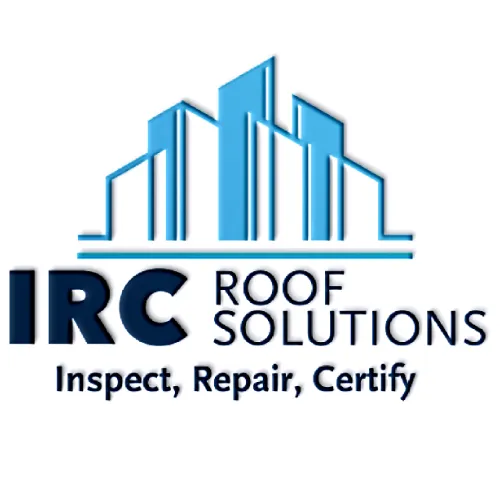Sponsored





Commercial Roof Repair in Pacoima, CA
Trusted Solutions To Protect Your Business Investment
Keep your business safe and operations running smoothly with expert commercial roof repair from Pacoima’s top professionals. From leak detection to structural Commercial Roofer, local specialists deliver prompt, high-quality repairs with minimal disruption. Browse our directory to quickly connect with experienced commercial roofing contractors in Pacoima today.
Commercial Roof Repair - Pacoima - Why Hire a Professional Commercial Roof Repair Service
Protecting Your Business Investment with Expert Roofing Solutions
The Importance of Commercial Roof Repair in Pacoima
In Pacoima’s climate, commercial roofs endure intense sun, heat expansion, occasional heavy rains, and seasonal winds. For businesses, a roof is not just a covering—it’s a vital structural component that protects inventory, equipment, employees, and customers. When a roof is compromised, the consequences can be costly: water damage, safety hazards, and even operational downtime.
Timely and professional commercial roof repair ensures that small issues—like leaks, punctures, or flashing damage—are addressed before they escalate into major structural problems. This preventive approach saves money, extends roof life, and keeps your business running without interruptions.
Why Professional Commercial Roof Repair Services are Essential
Commercial roofing systems are complex and often larger than residential roofs. They may involve flat or low-slope designs, heavy rooftop equipment, and specialized drainage systems. Professional contractors have the training and tools to diagnose and repair issues without compromising the roof’s structural integrity or safety.
Hiring a licensed commercial roof repair service in Pacoima ensures compliance with local building codes and safety regulations. It also protects your business from liability issues that could arise from improper repairs.
Professionals also understand which materials—such as TPO, PVC, EPDM, or modified bitumen—are best suited for Pacoima’s heat and seasonal weather changes, ensuring repairs last.
Common Commercial Roofing Issues in Pacoima
Water Leaks: Often caused by damaged membranes, worn flashing, or clogged drains, leaks can quickly damage ceilings, walls, and inventory.
Ponding Water: Flat or low-slope commercial roofs can develop standing water that accelerates material deterioration and leads to leaks.
Thermal Expansion: Heat causes roofing materials to expand and contract, leading to cracks and seam failures over time.
Storm Damage: High winds and debris can puncture or tear roofing membranes, requiring immediate repairs to prevent water intrusion.
The Professional Commercial Roof Repair Process
Inspection & Assessment: A thorough evaluation to identify all damage and potential problem areas.
Material Matching: Using compatible materials to ensure seamless repairs that maintain the roof’s integrity.
Repair Execution: Addressing leaks, replacing damaged sections, resealing seams, and improving drainage as needed.
Final Quality Check: Ensuring all work meets manufacturer specifications and industry standards.
Benefits of Hiring a Professional Commercial Roof Repair Service
Longevity: Professional repairs extend the lifespan of your roof, delaying the need for costly replacement.
Safety: Trained crews work with the right equipment to avoid accidents and property damage.
Cost Savings: Preventive repairs reduce the risk of major damage and business downtime.
Warranty Protection: Work performed by licensed contractors often comes with warranty coverage for labor and materials.
When to Call for Commercial Roof Repair in Pacoima
Business owners should schedule inspections at least twice a year and after severe weather events. Call a professional immediately if you notice water stains, bubbling roof membranes, loose flashing, or ponding water. Addressing these issues promptly prevents disruption and costly damage.
Final Thoughts
Your commercial roof is a major investment and a critical part of your business infrastructure. By hiring a professional commercial roof repair service in Pacoima, you ensure that repairs are done right the first time, with lasting results that protect your property, employees, and bottom line.
Your Trusted Roofing Experts

Google: 4.9 stars
Commercial Roofing, Roof Repair, Roof Maintenance, Roof Coating, Emergency Roofing Services
(818) 571-7892
Santa Clarita, CA 91350
Website: www.ircroofs.com
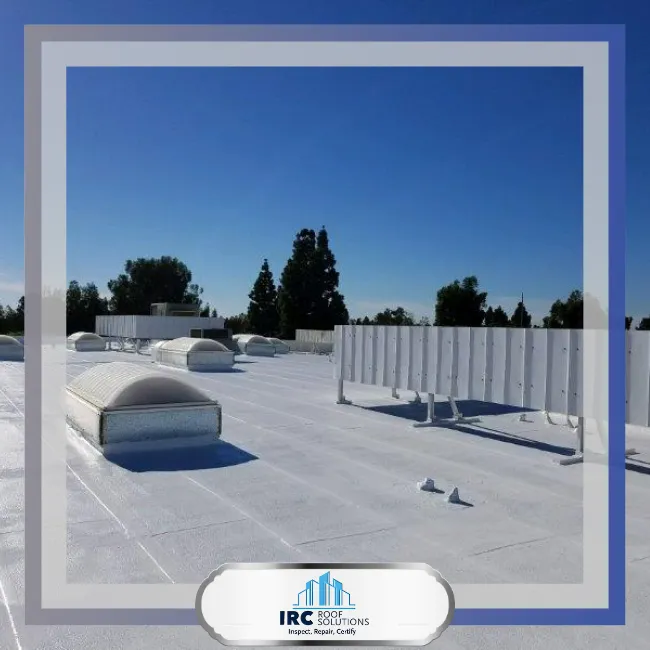
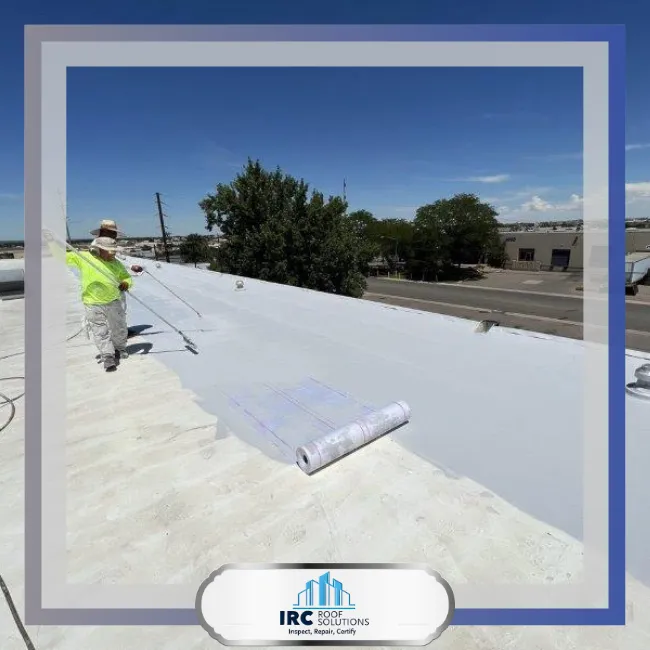
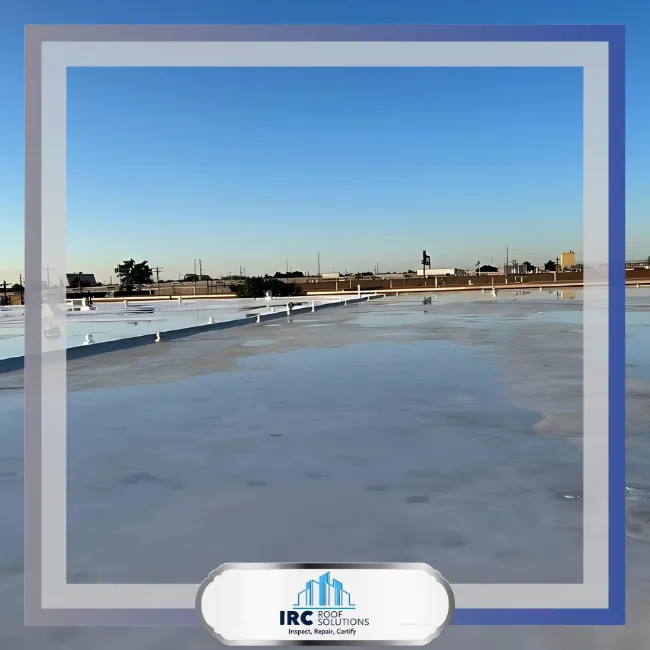
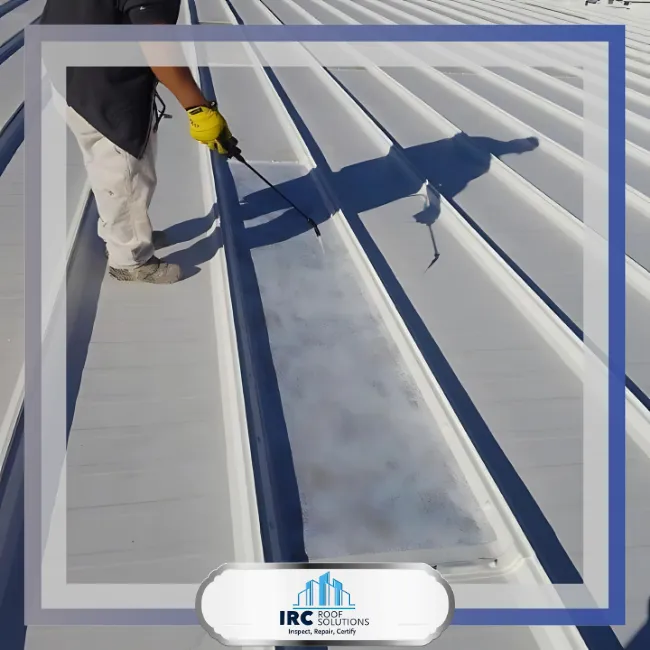
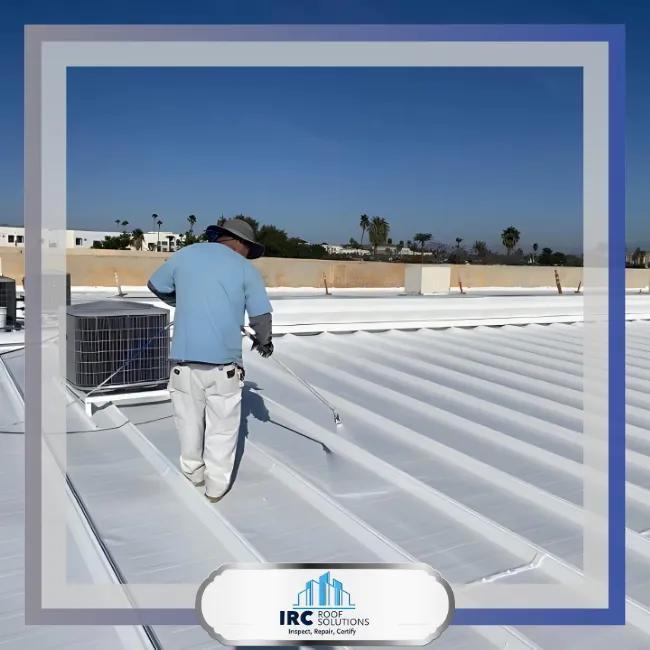
Owen & Sons Roofing
14117 Hubbard St #475, Sylmar, CA 91342
Roofing Contractor
Phone: (747) 298-7200
Hours: Daily, 5 AM - 10 PM
Arias Roofing Corp
12627 Van Nuys Blvd, Pacoima, CA 91331
Roofing Contractor
Phone: (818) 791-3190
Hours: Opens at 7 AM, Mon-Fri
ASteam AC Install
11003 San Fernando Rd, Pacoima, CA 91331
Roofing Contractor
Phone: (818) 474-9766
Hours: Open 24 hours, 7 days a week
Best Team Roofing
11150 Glenoaks Blvd #436, Pacoima, CA 91331
Roofing Contractor
Phone: (818) 877-4656
Hours: Daily, 5 AM - 10 PM
People Also Ask
Determining whether a roof needs repair or replacement depends on age, extent of damage, and overall system performance. Localized issues—such as a few membrane punctures, open seams, or isolated flashing failures—are typically strong candidates for targeted repair. Widespread problems like chronic ponding, saturated insulation across large areas, systemic blistering, or membrane shrinkage may indicate a declining system that is more cost‑effective to replace. A thorough moisture survey, core sample, and visual inspection help evaluate the condition of the membrane, insulation, and deck. Factoring in warranty status, code requirements, energy performance, and life‑cycle costs gives a clearer picture. If a roof still has significant service life and sound underlying components, strategic repairs paired with maintenance can safely extend its lifespan.
Most leaks originate at details rather than in open field membrane. Typical sources include failed flashing at curbs and parapets, loose counter‑flashing, open seams, compromised terminations, and punctures from foot traffic or dropped tools. Ponding water accelerates deterioration and can find pathways through defects, especially around scuppers and drains. Aging sealants at penetrations, UV exposure, thermal movement, and wind uplift also contribute to vulnerabilities. HVAC work and other trades sometimes damage the membrane or block drainage unintentionally. Regular inspections that focus on high‑risk details, prompt removal of debris, and protection walk pads around service paths reduce leak risk significantly. Addressing small issues quickly prevents moisture from reaching insulation and deck components, where repairs become more complex and costly.
A repair‑focused inspection documents current conditions and pinpoints root causes. Technicians typically review historical leak reports, then assess roof access, safety, and drainage layout. They examine membrane seams, terminations, flashings, penetrations, and edge details; check for punctures, blisters, wrinkles, or shrinkage; and verify slope to drains. Moisture detection may involve infrared scanning, electrical impedance testing, or strategic core samples to confirm saturation. Drains, scuppers, and strainers are cleared and evaluated. Findings are photographed and mapped to a roof plan, with prioritized recommendations distinguishing immediate leak stops from preventive work. The deliverable should outline materials, methods, and warranty implications, giving clear options for urgent repairs, follow‑up maintenance, and any capital planning for sections nearing end of life.
Repairs depend on the membrane type and manufacturer guidance. For TPO and PVC, technicians clean and prepare the surface, then heat‑weld compatible membrane patches with proper overlap and probe seams for continuity. EPDM repairs often use priming and pressure‑sensitive or liquid‑applied flashing products, ensuring edges are rolled and sealed. Modified bitumen repairs may involve cutting out damaged sections, drying the substrate, and installing new cap‑sheet patches with torch or cold‑process adhesives. Across all systems, detail work at penetrations and terminations is critical, as is verifying dry, sound insulation and substrate. High‑quality primers, cleaners, and patch materials matched to the existing system help ensure durability, while final inspection confirms adhesion, watertightness, and warranty compliance where applicable.
Issues that allow water intrusion or trap moisture should be prioritized promptly. Ponding lasting more than 48 hours after rainfall can accelerate membrane degradation, increase live load, and indicate inadequate slope or blocked drains—these conditions warrant quick correction. Blisters that are stable and dry may be monitored, but blisters that open, grow, or occur in high‑traffic areas are candidates for repair. Open seams or flashing separations present direct leak paths and should be sealed immediately. Timely action keeps moisture from saturating insulation and corroding the deck, which complicates repairs and drives costs. A simple rule: repair defects before the next significant weather event, and schedule follow‑up inspections to verify performance.
Warranty terms vary, but using approved materials and methods is essential to maintain coverage. Many manufacturers require repairs to be performed by qualified personnel, with documentation and photos. Unapproved adhesives, incompatible patches, or alterations to drainage and edge details can jeopardize warranty status. Regarding code compliance, repairs must not reduce fire, wind, or energy performance below applicable standards. When replacing wet insulation or large sections, additional requirements—such as thermal insulation values or edge metal design—may apply. The safest approach is to confirm system type, review current warranty terms, and align repair specifications with manufacturer and code guidance. Proper documentation helps preserve coverage and demonstrates due diligence during future audits or resale.
Weather has a direct effect on adhesives, primers, and welding quality. Cold temperatures can slow cure rates and reduce tack, requiring extended dwell times or winter‑grade products. High heat speeds curing but may demand careful handling to prevent flashing slump or over‑welding. Humidity and dew can interfere with adhesion, so surfaces must be dry and clean. Contractors often schedule detail work during optimal windows and may use temporary dry‑in measures if rain threatens. Planning around forecasted conditions, allowing proper curing, and performing adhesion tests help ensure long‑term performance. When conditions are marginal, short‑term leak stops can bridge to permanent repairs once temperatures and moisture levels improve.
Preventive maintenance focuses on drainage, detail integrity, and documentation. Semiannual inspections—often in spring and fall—plus checks after major storms catch small issues early. Clearing debris from drains and gutters, resecuring loose edge metal, touching up sealants, and repairing minor punctures protect the system’s weakest points. Walk pads at service routes reduce membrane wear from foot traffic. Maintaining a roof log with photos, repair records, and warranty information streamlines decision‑making and helps demonstrate proper care. Training on rooftop etiquette for all trades further reduces accidental damage. A modest, planned maintenance budget typically costs far less than emergency leak response and extends service life for the entire assembly.
Repair pricing reflects scope, access, and materials. Contractors assess the size and complexity of affected areas, number of details, and whether insulation or deck replacement is required. Building height, perimeter conditions, crane or elevator access, and safety provisions influence labor. System‑specific materials—membranes, primers, adhesives, and metals—are matched to the existing roof to ensure compatibility. Mobilization, moisture testing, and temporary protection may be included. Transparent proposals itemize tasks and clarify exclusions, allowing owners to compare approaches rather than just totals. While costs vary, well‑scoped repairs that address root causes generally deliver better value than repeated temporary fixes that leave underlying issues unresolved.
Effective planning keeps businesses operating smoothly during roof work. Crews can stage materials to maintain clear access, coordinate noisy tasks outside sensitive hours, and sequence repairs to protect entryways and loading areas. Interior protection—such as poly sheeting over critical equipment—and clear communication with occupants reduce risk and surprises. Odor‑sensitive areas may benefit from low‑VOC products or additional ventilation. For facilities with strict protocols, pre‑task plans, safety orientations, and escort procedures help align expectations. A single onsite contact for daily updates ensures quick responses to changing conditions. With a coordinated plan, most leak repairs can be executed safely and efficiently while normal operations continue.
Pacoima: A Vibrant Community in the San Fernando Valley
Celebrating Culture and Local Business
Pacoima, California, is a lively neighborhood situated in the San Fernando Valley, known for its rich cultural heritage, diverse population, and strong community ties. With its mix of residential areas, parks, and local businesses, Pacoima is a place where residents take pride in their community. In this article, we will explore what makes Pacoima unique and discuss the importance of supporting local businesses, especially in commercial roofing.
The history of Pacoima is deeply rooted in agriculture, with the area originally serving as farmland before transforming into a suburban neighborhood. Over the years, Pacoima has evolved into a vibrant community that embraces its cultural diversity and fosters a welcoming environment for residents and visitors alike.
One of the defining characteristics of Pacoima is its strong sense of community. Residents actively engage in various local events, including cultural festivals, farmers markets, and community clean-up days. These gatherings not only celebrate the neighborhood's heritage but also strengthen the bonds among residents.
Pacoima is home to numerous parks and recreational facilities that provide residents with opportunities for outdoor activities. **Pacoima City Park** and **Hansen Dam Recreation Center** are popular spots for families and individuals looking to enjoy nature and participate in recreational programs.
The economy of Pacoima is diverse, with various local businesses contributing to the neighborhood's vitality. From family-owned restaurants to shops and services, Pacoima's local businesses provide essential goods and services to residents while creating job opportunities within the community.
Community support for local businesses is crucial for fostering economic growth. By choosing to shop locally and dine at neighborhood restaurants, residents help ensure that these businesses thrive, ultimately benefiting the entire community. This support is especially important for smaller businesses that contribute to the unique character of Pacoima.
Education is a priority in Pacoima, with several public schools and educational programs available for children and families. The **Los Angeles Unified School District** serves the area, providing students with quality education and extracurricular activities that promote personal growth and development.
Pacoima is also committed to sustainability and environmental responsibility. Various initiatives encourage residents to participate in recycling programs, community gardening, and other eco-friendly practices. Local businesses are encouraged to adopt sustainable practices, contributing to a greener and healthier community.
The real estate market in Pacoima is active, with various housing options available to residents. From affordable apartments to single-family homes, the community appeals to a wide range of families and individuals. As the neighborhood grows, the demand for commercial spaces also increases, providing opportunities for new businesses.
Local businesses are essential to the economy of Pacoima, creating jobs and providing necessary services to residents. Supporting these businesses fosters a sense of community and encourages residents to engage with their local economy.
As Pacoima continues to develop, maintaining commercial properties is crucial. One key aspect of property maintenance is commercial roofing. A well-maintained roof is vital for protecting businesses from weather-related damage and ensuring the safety of customers and employees.
The climate in Pacoima presents specific challenges for commercial roofing, particularly with hot summers and occasional rain. Business owners must invest in durable roofing solutions to protect their investments. Local roofing contractors can provide tailored services to meet the specific needs of Pacoima businesses.
Partnering with local roofing experts allows business owners to benefit from personalized service and valuable insights into maintaining their roofs. Regular inspections and maintenance are essential for preventing costly repairs and ensuring roofs remain in optimal condition.
In conclusion, Pacoima, California, is a vibrant community characterized by its cultural diversity, strong community spirit, and commitment to supporting local businesses. As the area continues to evolve, the importance of maintaining commercial properties—especially roofing—grows. Investing in quality roofing solutions protects business investments and contributes to the overall health and vitality of the Pacoima community.
References: Wikipedia

